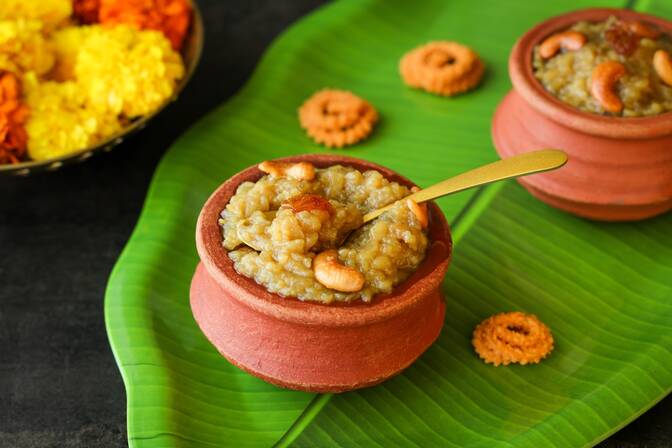Pongal
January 14, Tuesday
Odisha, Andaman and Nicobar, Andhra Pradesh, Arunachal Pradesh, Assam, Gujarat, Jharkhand, Karnataka, Puducherry, Sikkim, Telangana

Pongal is dedicated to thanking the Sun, Earth and cattle for the bountiful harvest. The festival lasts for four days and is usually celebrated in January, coinciding with the celebration of Makar Sankranti, one of the most important festivals in India that marks the change of solar position and the beginning of the solar year.
Pongal lasts for four days and each day has its own special significance and rituals:
Bhogi Pongal. This is the first day of the festival when people get rid of old things and negative energies, symbolizing renewal and the beginning of a new life. In the evening, people light bonfires in which they burn old and unnecessary things. This symbolizes the rejection of all the negativity that has accumulated over the year.
Thai Pongal. The second day, which is the main day of the festival. On this day, families prepare a special dish called "pongal", boiled from rice, milk and sugar, which is traditionally served with cane sugar. Pots of pongal are cooked outdoors in the sun to express gratitude to the Sun for a bountiful harvest. When the dish boils and spills over the edges of the pot, people exclaim "Pongalo Pongal!", which symbolizes abundance and prosperity.
Maattu Pongal. The third day is dedicated to cattle such as cows and buffaloes, which play an important role in agriculture. On this day, cattle are decorated with flowers, their horns are painted and prayers are said in gratitude for their work. Some villages also have traditional games like Jallikattu, where youngsters try to tame bulls.
Kannan Pongal. The fourth and final day is a day of gatherings and fun. Families come together, exchange gifts, and have picnics. The day also marks social interaction, strengthening family and community ties.
Symbolism and Traditions:
Sun Symbol. The sun plays a central role in Pongal, as the festival is dedicated to giving thanks for the sunlight that helps plants grow. People pray for health and prosperity, paying homage to Surya, the Sun God.
Cows and Bulls. Since they help in growing crops, cattle are an integral part of rural life, and this festival highlights their importance.
Food and Harvest. Rice, sugarcane, and other grains grown during the season symbolize fertility and abundance. Preparing food from the fresh harvest is an essential part of the festival.
Pongal in other years
- 2021 January 14, Thursday
- 2022 January 14, Friday
- 2022 14 - January 17, Friday – Monday
- 2023 January 14, Saturday
- 2024 January 14, Sunday
- 2026 January 14, Wednesday
